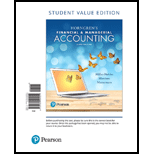
No significant influence equity investments:
These investments are the investments in equity securities where the investor holds less than 20% of the voting stock, and thereby the investor would not be able to participate in the decisions of the investee company. These investments are reported as the current assets or the long-term assets on the basis of the period which the investor holds the investments.
Given:
I Railway will represent 5% of the voting stock of Company P for three months.
To identify: How the given investment would be classified.
Explanation of Solution
When the investor invests in the debt or equity securities, holding less than 20% of the voting stock of the investee company, then such investment is known as no significant influence equity investment.
Hence, the correct answer is option b. no significant influence equity investment.
Justification for incorrect answers:
Option a. Significant interest investments are the equity securities where an investor holds more than 20%, but less than 50% of the voting stocks. Here, Railway I (investor) will own only 5% of the voting stock of Company P. Hence, option a. is incorrect answer.
Option c. Held-to-maturity investment is the investment which is held till their maturity date. Here, Railways I is not planning to hold the investment till maturity, but is planning to hold them for only three months. Hence, option c. is an incorrect answer.
Option d. Controlling interest investments are the equity securities where an investor holds more than 50% of the voting stocks. Here, Railway I will hold only 5% of the voting stock of the investee company. Hence, option d, is an incorrect answer.
Justification for correct answer:
Option b. As the investor company (Railway I) is considering investing in the investee company (Company P) representing less than 20% of the voting stock (5%) of the investee company, then such investment would be classified as a no significant influence equity investment.
Hence, option b. is the correct answer
Want to see more full solutions like this?
Chapter 10 Solutions
Horngren's Financial & Managerial Accounting, Student Value Edition Plus MyLab Accounting with Pearson eText -- Access Card Package (6th Edition)
- I am searching for the correct answer to this Finanacial accounting problem with proper accounting rules.arrow_forwardI need assistance with this general accounting question using appropriate principles.arrow_forwardI need help solving this Finanacial accounting question with the proper methodology.arrow_forward

 AccountingAccountingISBN:9781337272094Author:WARREN, Carl S., Reeve, James M., Duchac, Jonathan E.Publisher:Cengage Learning,
AccountingAccountingISBN:9781337272094Author:WARREN, Carl S., Reeve, James M., Duchac, Jonathan E.Publisher:Cengage Learning, Accounting Information SystemsAccountingISBN:9781337619202Author:Hall, James A.Publisher:Cengage Learning,
Accounting Information SystemsAccountingISBN:9781337619202Author:Hall, James A.Publisher:Cengage Learning, Horngren's Cost Accounting: A Managerial Emphasis...AccountingISBN:9780134475585Author:Srikant M. Datar, Madhav V. RajanPublisher:PEARSON
Horngren's Cost Accounting: A Managerial Emphasis...AccountingISBN:9780134475585Author:Srikant M. Datar, Madhav V. RajanPublisher:PEARSON Intermediate AccountingAccountingISBN:9781259722660Author:J. David Spiceland, Mark W. Nelson, Wayne M ThomasPublisher:McGraw-Hill Education
Intermediate AccountingAccountingISBN:9781259722660Author:J. David Spiceland, Mark W. Nelson, Wayne M ThomasPublisher:McGraw-Hill Education Financial and Managerial AccountingAccountingISBN:9781259726705Author:John J Wild, Ken W. Shaw, Barbara Chiappetta Fundamental Accounting PrinciplesPublisher:McGraw-Hill Education
Financial and Managerial AccountingAccountingISBN:9781259726705Author:John J Wild, Ken W. Shaw, Barbara Chiappetta Fundamental Accounting PrinciplesPublisher:McGraw-Hill Education





